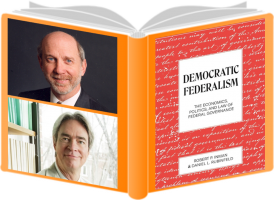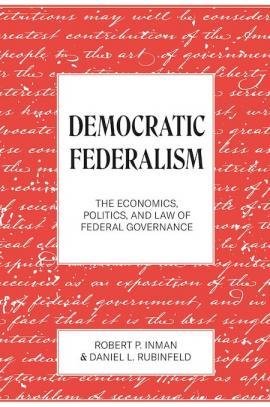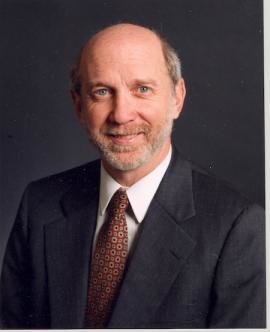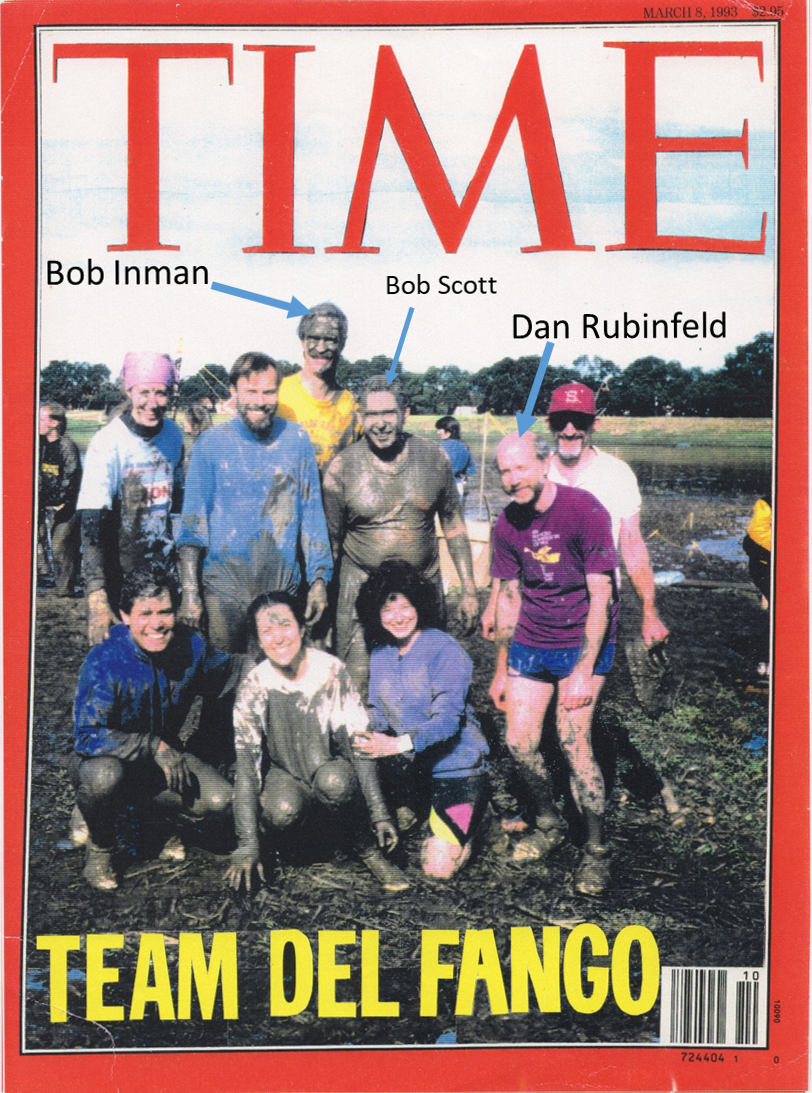
A conversation with former CASBS fellows Robert Inman and Daniel Rubinfeld
In June 2020, former CASBS fellows Robert Inman and Daniel Rubinfeld published their coauthored book, Democratic Federalism: The Economics, Politics, and Law of Federal Governance (Princeton Univ. Press). The book’s acknowledgments reveal, among other things, that “The ideas that form the basis for our own contributions to this conversation were first developed during a year spent at the Center for Advanced Study in the Behavioral Sciences, located on the campus of Stanford University.”
This is great! The authors contacted CASBS director Margaret Levi, informing her that a copy of the book was on its way for inclusion in the Center’s renowned Ralph W. Tyler Collection, and that the book is “evidence that the CASBS influence has a lifetime impact.”
Lifetime? Inman and Rubinfeld, you should know, were CASBS fellows in 1992-93. They had a book project then; today’s finished product, it turns out, is somewhat different than originally envisioned. We did a Q&A with the authors to explore this.

Robert Inman is the Richard K. Mellon Professor Emeritus of Finance, Economics, and Public Policy at the University of Pennsylvania. Daniel Rubinfeld is professor of law at New York University and the Robert L. Bridges Professor Emeritus of Law and professor emeritus of economics at the University of California, Berkeley.
Ever the consummate collaborators, Inman and Rubinfeld collaborated on this, working on and submitting their responses jointly.
CASBS: Congratulations on this important book. You two did a terrific Q&A with your publisher, Princeton University Press, on what the book is. We encourage readers to consider it an essential companion to this session. Let’s focus here on how the book came to be. You’ve enjoyed a rich collaboration, by our count 18 articles, book chapters, and other publications together. The earliest joint publication dates to 1979. But your 1992-93 CASBS year launched a new research program together. Was this planned? Did you basically curate your project into CASBS?
Robert Inman and Daniel Rubinfeld: Our year was planned, but only in the broadest sense. As you noted, just after graduate school we completed a major project entitled “The Judicial Pursuit of Local Equity,” published in the Harvard Law Review in 1979. That project grew out of dissertation work at Harvard (Bob) and MIT (Dan) and subsequent conversations as to what role local governments might realistically play to promote fairness in the provision of government services. The answer we felt was, not much – at least not without the help of national or state funding. That project got us started thinking more deeply about the relationship of federal governance to the provision of public services, both from perspective of economic efficiency and also with respect to fairness. For the next few years we worked on these issues separately, yet kept thinking about the benefits of a larger research project examining the roles of all levels of government for the financing and provision of public services. A year at the Center seemed the perfect way to pull our thinking together with the hope of a book manuscript as the final product. Little did we anticipate the full consequences of the CASBS experience! We came in as economists thinking we might update the original treatise by Wallace Oates – Fiscal Federalism. But after a year with our CASBS colleagues, we left feeling we knew at best one-third of the story; up to then, we had been missing all the important work on federalism by contemporary political scientists and legal scholars. Despite (maybe because of) our great respect for Wally’s research, the project called “Wally Oates redux” was shelved. The CASBS year pushed us into new directions, with Bob focusing on the political economy and Dan on the law and economics of federal governance. You counted 18 subsequent papers with both our names, that list is easily missing another five or six papers on federal governance done separately. Simply, our CASBS year was a pivot point for our research careers.
C: What was the basic idea or motivating intellectual force behind the original project, and why CASBS and not someplace else to locate it during your sabbatical year?
RI & DR: As mentioned, we came to this project from our training as economists, luckily having been students of the intellectual founders of the modern theory of economic federalism: Paul Samuelson at MIT and Richard Musgrave at Harvard. Their work provided the foundation for our own initial thinking about federal governance, with Samuelson’s work on efficient federalism (well, Charles Tiebout’s critique of Samuelson was important too) and Musgrave’s work on horizontal and vertical equity in federal systems. Oates’ text was built on their ideas, and we thought as their students we might update Wally’s book. During those first few months, casual luncheon conversations with our colleagues at CASBS from economics (Bob Frank, Chuck Manski) political science and organization theory (Peter Hall, Terry Moe, Doug Rivers, David Knoke) and the law (Robert Nelson) made it clear to us how much we didn’t know about these other disciplines, and how essential those insights could be for a truer understanding of federal governance. We doubt we could have found such wise advice, delivered so “gently,” anywhere but the Center. Peter, in particular, introduced us to the work of William Riker and Samuel Beer (the “Samuelson” and “Musgrave” of federal political theory), whose influence on our future work and the final book would become obvious.

C: Evidently you worked out the core theory/thesis of Democratic Federalism during your CASBS year. True? What is it in a nutshell?
RI & DR: We certainly got started on our core theory for Democratic Federalism at the Center, but the details took time. One important side benefits of a twenty-eight year (!!) gestation period has been the chance to study and absorb all the truly exceptional new work on federal governance that became available to us over those years. The core thesis of the project is relatively easy to state: Federal governance – the use of constitutionally independent levels of governments (national, state, local) – has the potential to provide three benefits required of any democratic society: first and perhaps most importantly, the protection and promotion of individual rights and liberties; second, the opportunity for all citizens to actively participate in the democratic process; and third, the democratic institutions needed to provide core public services, efficiently and fairly, needed for a valued life. We stress the word potential, for much of the book examines when the institutions of federal governance might succeed or fail to achieve these three objectives. It will be no shock to learn that as economists, we stress that trade-offs are often required, and that federalism may not be for everyone. Federal governance is most valuable when citizens have different views as to the best allocation of social resources but will only work well when they are willing to listen to the arguments of others, respect differences, and compromise when required. The book provides a framework for how we might have such a “federal” conversation. Federal governance is not needed if we all agree and will not work when our disagreements are so fundamental that compromise is not possible. All that said, it was striking to us in drafting the book’s introduction to find that just over 46 percent of the world’s population and 54 percent of the world’s income – 53 percent of population and 71 percent of income, if you include the EU – is now governed by the institutions studied in Democratic Federalism.
C: The summaries of your CASBS year that you each separately wrote and submitted in June 1993 note significant progress on the project – at least four papers, the core theory section of a book, and a detailed proposal, and even a book contract for a co-authored book that you expected to finish in late 1994. Is that this book? And if so, how is your book published in 2020 different from the book that might have been published in 1994? Now, we are thrilled that the book is now here. Publication delayed – for 28 years or so – thankfully was not publication denied. But inquiring minds want to know: What the heck took so long?!?!
RI & DR: Ouch! There are two answers to this question. The first is our official response for a public forum: Whenever we set out to begin a chapter, we soon decided there was much new work to be done, and perhaps we could make a contribution. This was certainly true for our joint work on business regulation – known as the “state action doctrine” – published in the Texas Law Review, and for our joint papers on the then-emerging European Union in 2000. Perhaps the most rewarding detour was the opportunity, beginning in June 1994, to advise the newly formed constitutional committee drafting the fiscal chapters for the Republic of South Africa’s new federal constitution, and then to advise the revenue and spending ministries over the next six years regarding the implementation of the new system of federal governance. The federal structure proved foundational for RSA’s path to democracy, an argument we then made in two subsequent academic articles, one published in the interdisciplinary journal called the Journal of Law, Economics, and Organization and the other as Dan’s presidential address to the American Law and Economics Association. Finally, the 2009 Great Recession opened yet another chance for new work, the study of President Obama’s policy for using state and local governments to distribute his nationally funded stimulus program to kick-start the economy. Each of these projects has found a central place in chapters in our book.
The second reason, to be shared only among friends (we count all CASBS colleagues as such): Bob confesses he had a hard time letting chapters go; fortunately, Dan proved the patient colleague needed to bring things to closure.

C: Bob, you wrote in your 1993 year-end summary that “There is no question that this joint research could not have completed without the opportunity to work together at the Center.” Dan, you wrote “The opportunity to discuss and develop ideas without disruption has been wonderful for both of us.” Let’s remember you two lived geographically apart, and in those days collaboration wasn’t so simple.
RI & DR: It was clear to us that the proximity provided by CASBS would be a huge advantage for our future work. This only dates us, of course, but when we were writing our paper for Harvard Law Review the most important piece of technology was a cassette recorder! After graduate school and writing our first joint paper, Dan was at the University Michigan and Bob at the University of Pennsylvania. We would mail drafts of the paper to the other with voice recordings outlining all changes and new work. It worked, but needless to say, the thought of having offices at the Center sounded very attractive. But as we mentioned, equally important were the conversations with our Center colleagues. In the middle of our stay, the Center helped arrange for a small travel grant from the Smith Richardson Foundation to hold three interdisciplinary seminars on federalism with outside talks by Akhil Amar (a legal scholar), Barry Weingast (a political scientist), and Wally Oates (an economist). We both also presented our own beginning thoughts for the now refocused book project. The reputation of the Center among social scientists made it easy to attract Akhil, Barry, and Wally for a visit, as well as federalism scholars from Berkeley and Stanford to the seminars.
C: We're grateful CASBS could play a role in your enduring collaboration. While we have you, let’s put the book aside. Are there any other remembrances of your CASBS year that stick out in your mind?
RI & DR: We can only hope something like our “collective passion” emerges for future CASBS classes – ours was volleyball and CASBS participation in the Stanford Mud Volleyball Tournament, at least in those days held each spring on campus along the banks of Lake Lagunitas. [Then CASBS associate director] Bob Scott was our coach and mentor, and Lynn Gale, who had played serious college volleyball before joining the CASBS staff (no doubt a Scott recruit), was our star. We think we might have won more than we lost, but who cared! Bob Scott now has a copy of our book as a thank you for his support, and he insists that the team photo of us covered in mud has to replace our faculty headshots for the paperback edition. Fine by us, since CASBS is where it all began.
C: About that team photo...

The book is Democratic Federalism: The Economics, Politics, and Law of Federal Governance (Princeton University Press).
Mud volleyball photo courtesy of Bob Scott (with apologies to Time).
Graphics: Ravi Shivanna
Q&A conducted and edited by Mike Gaetani
